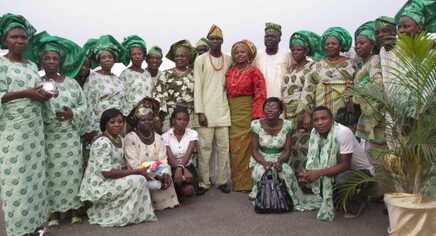
Technology is both a blessing and a curse in terms of how people use it in our religion. Whether we like it or not, in the 21st century technology is here to stay, regardless of our conflicting feelings about it. It exists all around us, and even if we shut our eyes to it, it’s still there. So, today I want to reflect on how technology has challenged our traditional definition of “community” when we talk about our religious connections to others, specifically in the world of Orisha worship.
Traditional communities
 Traditional communities spent time together in close contact
Traditional communities spent time together in close contact For centuries, Orisha worship was a way of life passed down from one generation to the next, shared among members of a specific community made up of friends, families, neighbors who came from a similar background and shared a similar worldview. They spoke the same language and shared a culture, which allowed them to define community in very personal terms, as themselves in relationship to those they came into contact with on a regular basis, people they interacted with face to face, and who had played a role in their spiritual growth and development. Godparents, godchildren, god-siblings, and extended Ocha family members worked each other’s ceremonies, and interacted not only in a religious setting but also a social one. Everyone in the town knew everyone, and if someone was in need because of a serious illness, accident, loss, or the unexpected death of a loved one, their religious brothers and sisters provided what support they could, along with other friends and family, so that the individual had the best possibility of surviving the hardship and coming out the other side intact. In communities where people lacked money, they might provide food or shelter, watch after children, do chores, or provide transportation to the doctor. The community came together in good times to celebrate and in bad times to comfort each other or strategize about how to confront problems and survive. These communities weren’t perfect. There were rivalries, competition, envy, disagreements at times. But belonging to a community gave people in that community a sense of identity, of belonging, and of purpose. It connected them to other people in meaningful, human ways.
 Migration patterns in the 19th century spread our religion far and wide
Migration patterns in the 19th century spread our religion far and wide Some traditional communities like this still exist, primarily in Yorubaland, Cuba, Brazil, and to some extent in other parts of the diaspora where Orisha worshippers have established themselves in significant numbers and have interacted with each other for several generations. But from the 19th century onward, we have become a progressively more migratory group of people, as individuals and families were uprooted and transplanted in new places. The slave trade wasn’t the only reason this happened. The 19th century was a time when transportation between one place and another became more possible, when people decided to seek their fortunes in other places, when civil war or social unrest or political situations forced people to leave home for new lands, or where economic hardship made life impossible at “home” and forced people to look elsewhere for prosperity. People traveled back and forth between Africa and the New World, Africa and Europe, between the Caribbean, South America and North America, between New World and Europe... As people spread around the world, so did our religion. By the mid-20th century, an increasing number of Cubans were leaving Cuba for the USA and other lands, and many brought Orisha worship to New York and Miami. From there, it spread to other places, and eventually some people were led back to Cuba or Africa, in search of their roots. The migratory nature of our existence in modern times has changed the way we think about community, as well as the place we call “home” and the place we feel we “belong.” Who makes up our community when we have moved from place to place, when our relationships are geographically scattered, and in some cases, the original relationships broken? What community do we belong to if we’re living in a place with very few Orisha worshippers, or with people who don’t understand our language or our culture? When we have no face-to-face contact with the people who brought us into the religion in the first place, do we cease to have a community?
Can we create new communities?
 Are online connections helping or hurting us?
Are online connections helping or hurting us? I don’t have answers to these questions – who does? – but it’s obvious that the growth of online religious forums on social media, youtube channels devoted to Orisha topics, online classes and podcasts on religious topics is related to the perceived need or desire of people to connect to each other in virtual communities as a way to complement, substitute, or add to their real-life community interactions. Little by little, the concept of “community” has crossed over into the online world, connecting us as “friends” or religious brothers and sisters of people we’ve never met in person. When we talk about our community on Facebook, it’s no longer clear exactly who we mean. Everyone in the forum? Only the people we know in real-life? Only our own religious family? The members of our ilé? Everyone in our lineage? We discuss topics like the responsibilities and obligations of community members to each other without having a common definition of who our community is, and this can easily lead to misunderstandings and conflicts. The broader and wider our community is, the more possibility there is for mutual aid and support, especially in social causes like defending our religious rights in court, demanding equal protection under the constitution, and confronting mainstream media sources who demonize us in their news reports and dramatized tv series and films. There is strength in unity, in solidarity, in numbers. However, there’s also a lot more room for misunderstandings and disagreements about who we are, what we hope to do, and why. It becomes increasingly harder to work together when we don’t know who is in our community and who isn’t, and there’s no recognized leadership or direction that ties us all together. Some people push toward unity and talk about the benefits of having a formally structured organization like a church or institution that provides umbrella coverage to us all. Others say they follow the customs of their house, their lineage, their community, and don’t want or need uniformity because they want to honor the teachings of their elders. These are debates that won’t be resolved easily, and may never be.
But, we can all reflect on a personal level about what the word community means to us, as individuals. We can recognize and acknowledge the fact that online communities aren’t the same as real-life communities, and decide for ourselves how we want to interact with each. Many people will say that the religion can only be practiced in real-life settings, with face to face interaction. Indeed, in terms of ceremonies and rituals, most of us who identify as Lucumi believe this absolutely true. There’s no replacement for the relationship between godparent and godchild. No one can practice the religion in total isolation. Most of what we do ritually and ceremonially involves at least two people, and often more. And we must absolutely be connected to our ancestors and the ancestors of our godparents, our egun of blood and stone, who led us into the religion and who make our spiritual evolution possible. There is no replacement for a real-life community, and people who are without one need to make a serious effort to find or create one for themselves. Not an easy task, by any means, but there’s no way around it.
But, we can all reflect on a personal level about what the word community means to us, as individuals. We can recognize and acknowledge the fact that online communities aren’t the same as real-life communities, and decide for ourselves how we want to interact with each. Many people will say that the religion can only be practiced in real-life settings, with face to face interaction. Indeed, in terms of ceremonies and rituals, most of us who identify as Lucumi believe this absolutely true. There’s no replacement for the relationship between godparent and godchild. No one can practice the religion in total isolation. Most of what we do ritually and ceremonially involves at least two people, and often more. And we must absolutely be connected to our ancestors and the ancestors of our godparents, our egun of blood and stone, who led us into the religion and who make our spiritual evolution possible. There is no replacement for a real-life community, and people who are without one need to make a serious effort to find or create one for themselves. Not an easy task, by any means, but there’s no way around it.
Is there a solution?
 What should we do with the technology we have?
What should we do with the technology we have? Does this mean that online communities are worthless, and technology has no place in our religion? As a person with a practical mindset, I would have to argue “no.” Technology is a tool, like anything else, and a lot depends on how we choose to use it. Technology allows us to stay in touch with our real-life community back home when we’re physically in another place. We can video-chat with our godparents or godchildren any time we like. Airplanes make it possible to travel quickly across many miles, so we can visit more often than people did 100 years ago. We can “go home” to our original community as often as money and time permit, so ties don’t have to break just because we move away. Digitized books and documents about the religion can be shared by e mail attachment or put on the cloud, where lots of people have access to them. We can acquire a virtual library of books and articles about the religion that we would never have found in local libraries or bookshops a few generations ago. We can hear Orisha music, watch Orisha dances, and see processions and feast days celebrated an ocean away just by looking on Youtube. We can sign up for classes and seminars taught by reputable people. We can buy products from online botanicas and have them sent to our home. And we can expand our social circles and meet extremely interesting and intelligent people in online forums, allowing us to learn about differences and similarities from house to house or across traditions. Online dictionaries and translators make it possible for people who don’t speak a language to access and understand written texts that previously would have been hard to understand. These are just a few examples of how technology can be used well. As an educator, I’m especially interested in exploring how technology can be used to teach and learn about the religion. It will never replace face-to-face teaching and learning, but it can be a useful aid, especially for people who don’t have religious elders and haven’t found their own community yet.
I don’t have to say much about the down side of technology. We all know what that is. It opens to door to charlatans, scammers, crooks, abusers, people who are fishing for vulnerable ‘catches” who will pay them a lot of money for phony services and supplies. It creates larger than life personalities who try to become major “influencers” when their own knowledge of the religion is slight. What they don’t know, they make up, and that does a lot of damage by spreading false information or misunderstandings of religious principles. It also allows people to hide behind onscreen personalities and lash out at others, create drama, sow dissent and dissatisfaction, and generally stir up trouble by “trolling” forums for a reaction, to set a war in motion. We’ve all seen these trends, and it has turned a lot of elders off Facebook forums, because it’s simply not worth the effort to combat these bad behaviors online.
So, what are your thoughts about “communities,” online and otherwise? Who is your community? How did you find where you belong? What do you think your duties and obligations are to other community members? Do online communities add anything meaningful to your life? I’d love to hear your input. You can post to OUR community forum on facebook – LOL, yes I use the word community on facebook, too, to refer to those who are reading and thinking about the topics we discuss here. Hope to hear from you. Click here to go to the facebook group. .
I don’t have to say much about the down side of technology. We all know what that is. It opens to door to charlatans, scammers, crooks, abusers, people who are fishing for vulnerable ‘catches” who will pay them a lot of money for phony services and supplies. It creates larger than life personalities who try to become major “influencers” when their own knowledge of the religion is slight. What they don’t know, they make up, and that does a lot of damage by spreading false information or misunderstandings of religious principles. It also allows people to hide behind onscreen personalities and lash out at others, create drama, sow dissent and dissatisfaction, and generally stir up trouble by “trolling” forums for a reaction, to set a war in motion. We’ve all seen these trends, and it has turned a lot of elders off Facebook forums, because it’s simply not worth the effort to combat these bad behaviors online.
So, what are your thoughts about “communities,” online and otherwise? Who is your community? How did you find where you belong? What do you think your duties and obligations are to other community members? Do online communities add anything meaningful to your life? I’d love to hear your input. You can post to OUR community forum on facebook – LOL, yes I use the word community on facebook, too, to refer to those who are reading and thinking about the topics we discuss here. Hope to hear from you. Click here to go to the facebook group. .
 RSS Feed
RSS Feed
